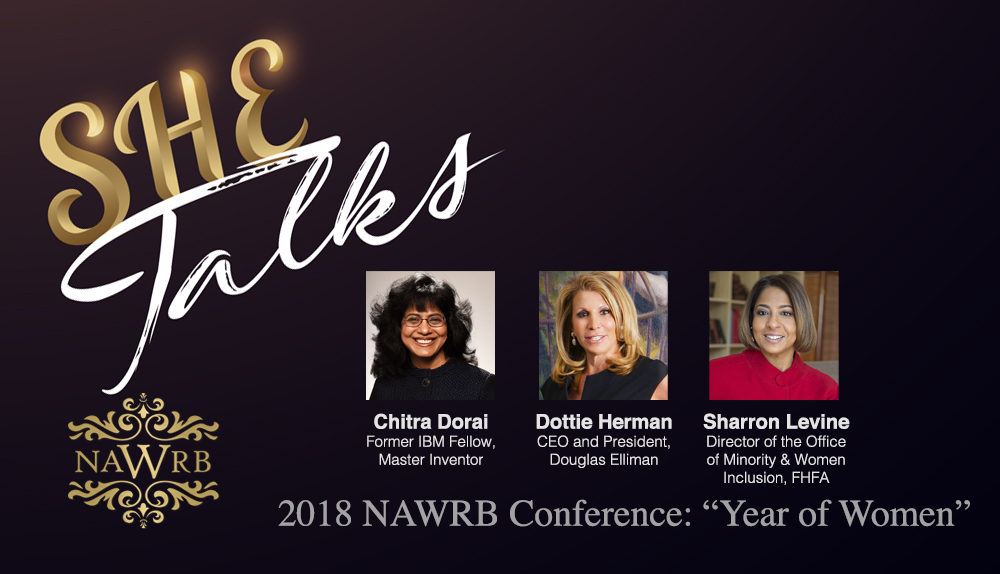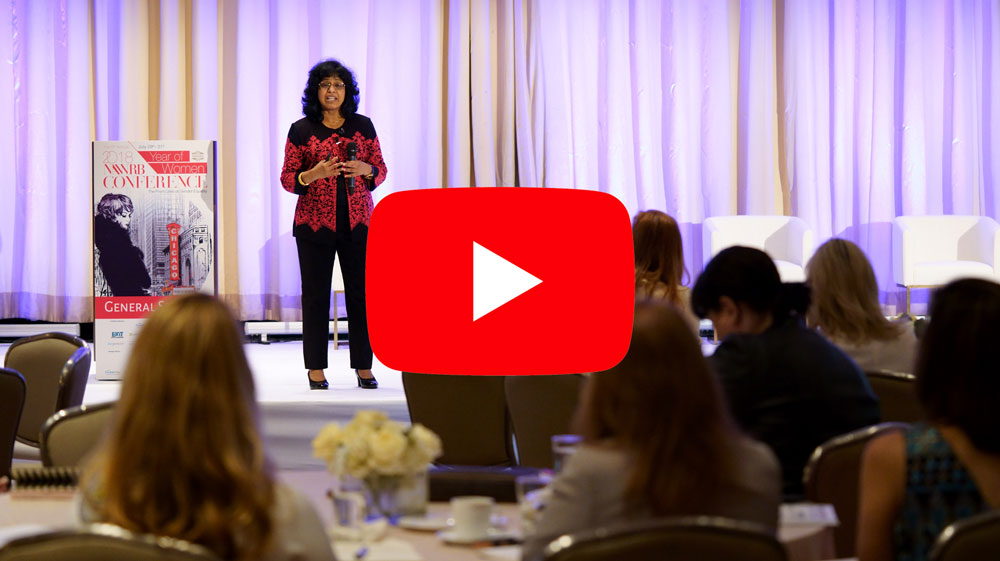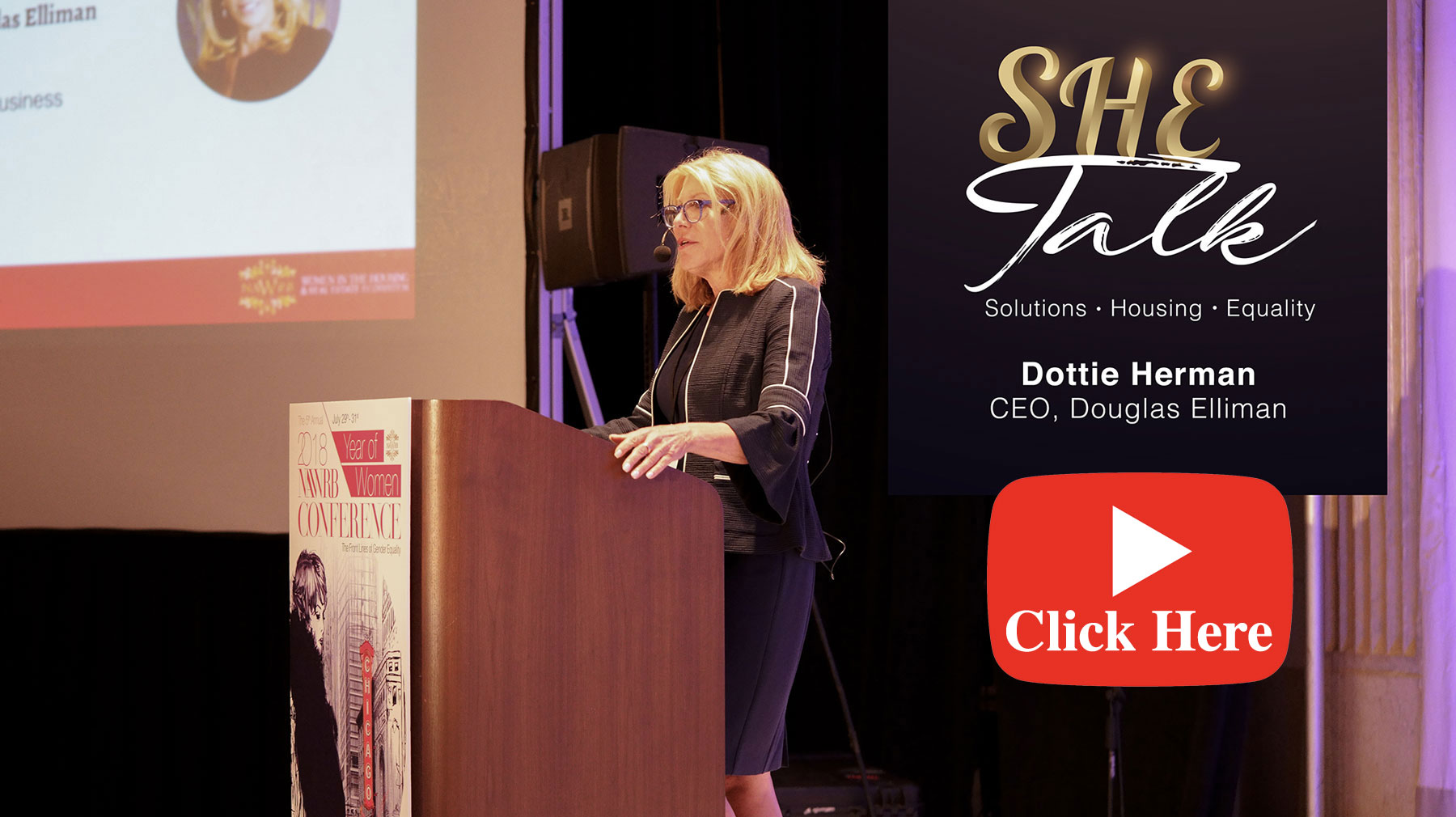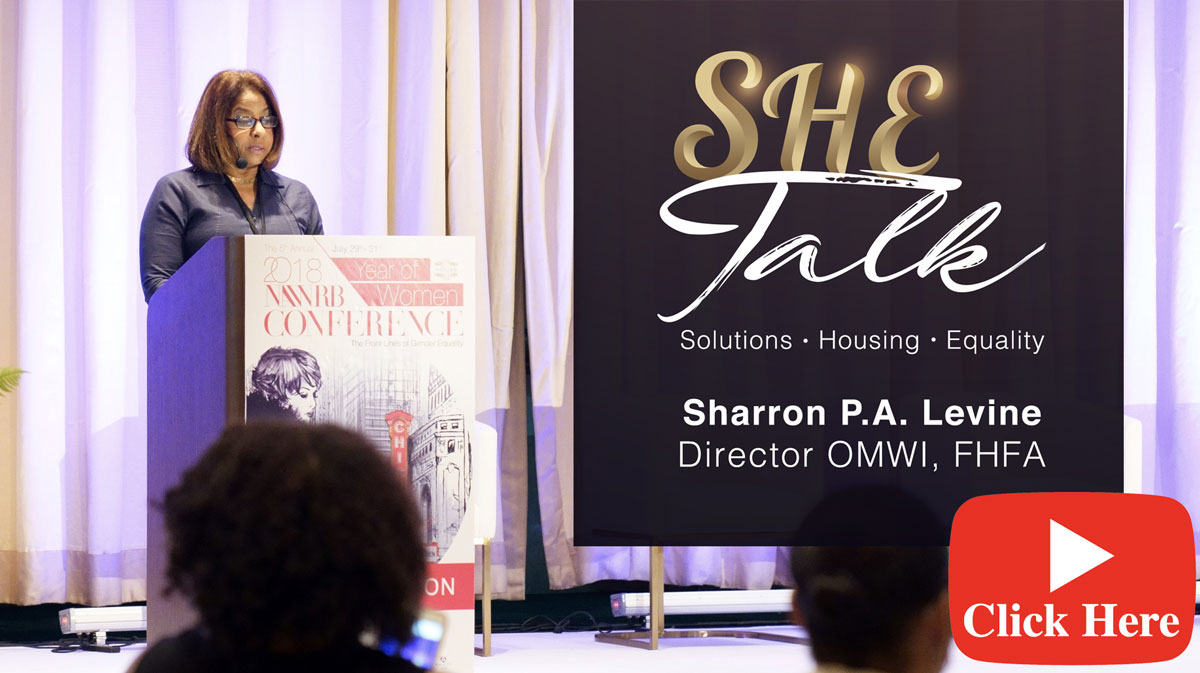We kicked off the 2018 NAWRB 5th Annual Conference, “Year of Women,” this morning with three inspiring SHETalks by Sharron P.A. Levine, Director of the Office of Minority and Women Inclusion (OMWI) at the Federal Housing Finance Agency (FHFA); Dr. Chitra Dorai, Former IBM Fellow and Master Inventor; and Dottie Herman, CEO of Douglas Elliman. All of these thought leaders and business owners delivered enlightening sound bites of important issues affecting the industry, such as opportunities for women in housing as professionals and consumers, Technology Human Balance and the rules for building a successful business.
Sharron P.A. Levine was the first in today’s series and she gave an historical overview of housing for minorities and women, focusing on how housing design has changed through the 20th and 21st centuries and how housing policy and design has impacted women’s lives.
Men have typically defined women’s housing options, but Levine focuses our attention to early feminists Harriet Beecher Stowe and Catherine Beecher, who both influenced the housing designs we still see in today’s kitchens. Since housing policy during the Great Depression forced women to stay at home while men worked, these women created innovative designs to help mitigate the workload women had at home.
She shared that only 40 percent of architects are women. How else could women influence housing design if they comprised a greater share of the minds creating the structure of housing for not only single families, but for multi-generational families and public housing? These are important questions she has us consider.
Levine reveals the unfortunate history of public housing, which has been fraught with punitive welfare policies, lack of capable management and building security which has led to inadequate living conditions and life-threatening illnesses and destruction. Professionals should focus their attention on how we can address these issues in public housing, which are dominantly affecting poor communities, as well as how we can create more adaptive housing.
Dr. Chitra Dorai took the stage next to deliver her speech on Technology Human Balance ™, where she talked about the ABC’s of Modern Technology- Artificial Intelligence (AI), blockchain and cloud- and how we should responsibly use AI in our workforce while also ensuring our own human agency. First she began by giving an overview of the three patterns of AI, including Discovery (creating new insights), Decision (providing bias-free advice) and Engagement (interacting and assisting through understanding and reasoning).
While we know AI as chat bots and Siri or Alexa, it will become a common helper in the real estate finance industry, such as being able to communicate with buyers in an intelligent (and maybe emotionally intelligent) manner, and identify important signals for regulations through RegTech. She reveals that current technology has created AI that can even make haircut appointments on behalf of its owner. The example she shared showed an AI that understands and speaks almost identical to the way a human young woman would sound like, including speech patterns and mannerisms such as “Mhmm.”
Finally, she addressed where she believes we are headed in terms of AI. We are seeing new frontiers of automation, which includes robotic process automation and intelligent process automation in addition to basic automation that can do processing transactions. Many fear that AI will take over our jobs or worry that the creators of AI will intentionally (or unintentionally) include their own biases into new technology, causing more roadblocks and harm to minorities.
Avoiding these potential problems will involve a balancing act of purpose, transparency and trust. We must create purposeful technology, be transparent about the use of AI, and have trust AI will be put in the right hands with the right intentions. While experts in technology will continue to develop AI to heightened intelligence and abilities, others will simultaneously do work to analyze the ethics and implications of this new tool.
Dottie Herman gave the closing SHETalk by telling the engaging and heartfelt story of her success, from her risk of buying Merril from Prudential and having the tenacity to ask angel investors to invest in her dreams, to the steps she has taken to build what is now the third-largest company in America with a revenue of over $27 billion.
Herman shares that those who build successful businesses must be passionate and knowledgeable of work culture. You cannot be successful in anything you are not passionate about, and culture is the glue that often holds a business and its employees together. With passion, she articulates that an entrepreneur must also be persistent and stay on the track to their dreams even when they face roadblocks. She shares her journey of taking a leap of faith to buy a real estate company at the young age of 29 even when she did not have secure funds and heard “no.”
“Sometimes opportunity hits you on the head and you just don’t see it,” she states. Well, she saw the opportunity and wasn’t going to let it go, and that passion is what drove her continued success as a business owner of a company that now expands across the country.
She gave unforgettable words of wisdom for women business leaders about how to successfully lead and nurture one’s employees. “Being a good mentor is what you need in running a business,” she emphasizes. “Teach [your employees] to trust themselves and give them confidence.” Also, leaders need to make sure they are providing their workers advancement opportunities that are necessary for growth in confidence.
Other useful tips include surrounding yourself with workers who have the skills you do not, and being willing to hire people that are good at what they do and have the potential to successfully run your own business. Also, a good leader embraces their employees’ successes as much as their failures. The latter are often learning experiences and lessons that will make them stronger workers in the future. Overall, her overarching theme is that building culture falls upon the leader to engage with their employees, treat them like family, give them opportunities to reach their full potential and be a responsible role model.
NAWRB would like to thank these phenomenal thought leaders for gifting our conference with their memorable lessons and insights. Stay tuned for the rest of today’s expert panels and the Keynote Address from Diana Mendley Rauner, First Lady of Illinois and the President of the Ounce of Prevention Fund.

 Login
Login




